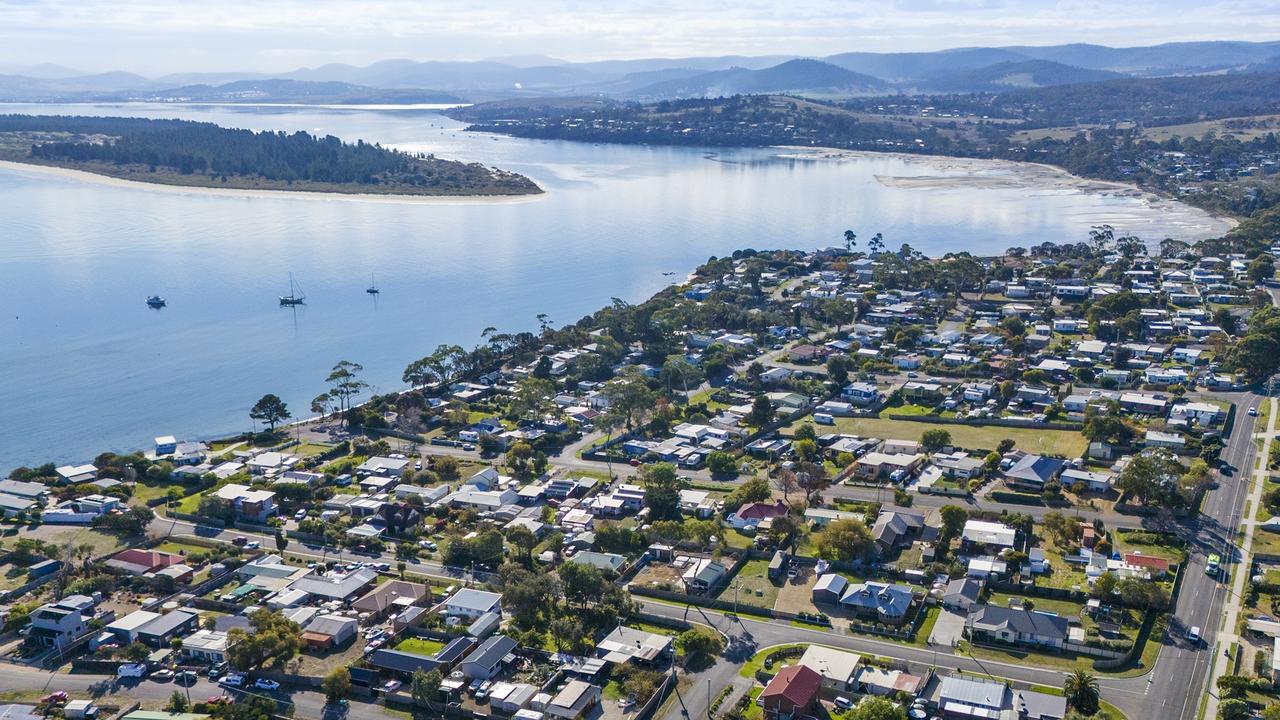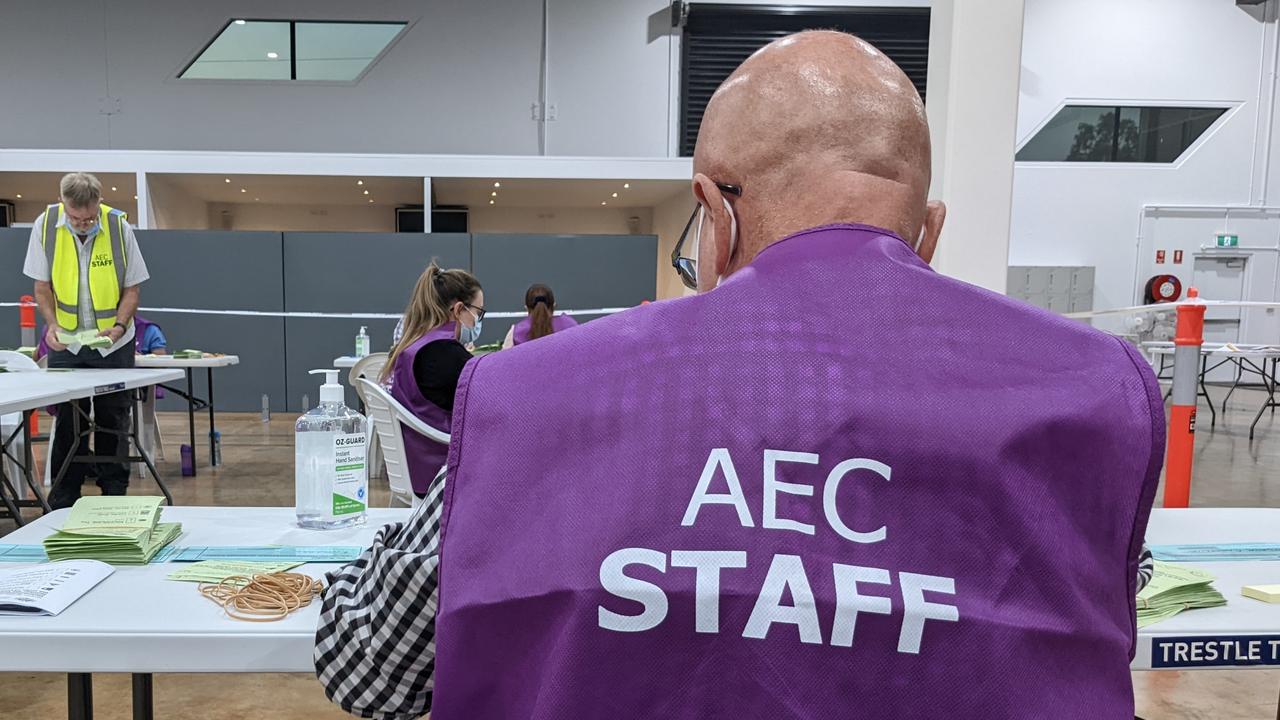Protesters walk a fine line in fight for animal rights
A protest on the Tasman Bridge last week enraged morning commuters and sparked public debate. But, as ANNE MATHER discovered, there is a wide range of views even within the ranks of animal rights advocates.
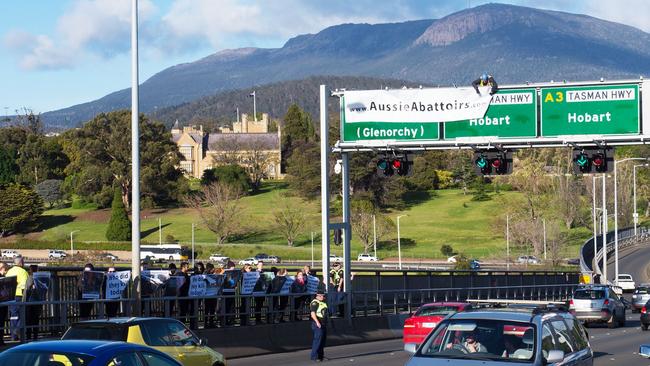
THERE are those prepared to climb bridges with placards to stop animals from being slaughtered for human consumption.
And others will write letters to the RSPCA when confronted by a bowl of goldfish at Mona.
Animal rights advocates and animal welfare enthusiasts have campaign styles as broad as the spectrum of beliefs on the issue. While the group that caused chaos last week on Hobart’s Tasman Bridge is sorry about the traffic jam, the fight continues and more action is coming Tasmania’s way.
“We have some exciting campaigns planned for the future,” says Animal Liberation Tasmania spokeswoman Mehr Gupta.
Tasmania has a long and proud history of activism, and there are animal rights advocates throughout the state making big and small statements all the time.
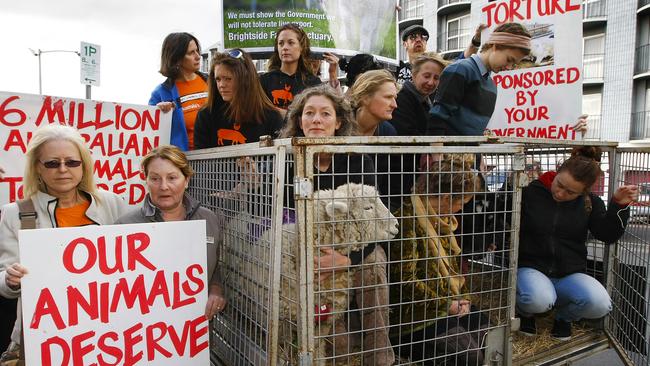
For some, it’s the simple act of refusing meat, while others will raid battery egg farms and a few will picket RSPCA sausage sizzles.
The RSPCA, while respectful of all views, says its sausage sizzles are also for the greater good: raising money for animal welfare.
RSPCA Tasmania general manager Peter West says the organisation is respectful of all views, “but we live in a society where most people want to eat a sausage sanger”.
Tasmania is also a state of pet lovers, with the highest dog and cat ownership in the country, who will go into bat for a goldfish.
Testament to the ardour are the letters of complaint to the RSPCA about the live goldfish swimming around a large carving knife in porcelain bowl at Mona.
Those concerned voices forced Mona to think about the art from the perspective of the goldfish, and the gallery took steps to employ fish-friendly guidelines.
“They change the water regularly, they rotate the goldfish, and the knife is blunt,” says fish vet Richmond Loh, who was consulted on the art.
While Mona’s animal welfare issue was a quiet exchange between experts and fish lovers, many activists want as wide an audience as possible.
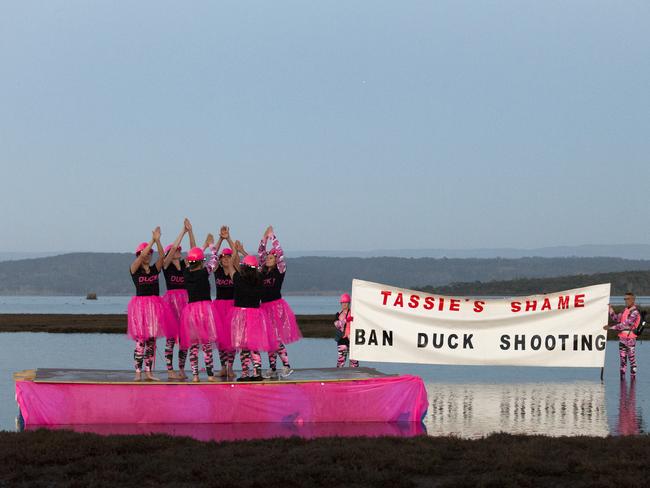
The activists who donned pink tutus to perform Swan Lake in front of gun-toting hunters at this year’s launch of Tasmania’s duck season knew how to turn heads.
And those who recently lobbied the Huon Valley to rename Eggs and Bacon Bay with a more ethical moniker, such as Apple and Cherry Bay, achieved the desired publicity even though the name remains the same.
Protests and media stunts inevitably get one side of the animal rights debate off side, but the protest on the Tasman Bridge managed to raise the ire of both camps.
In the words of respected Tasmanian animal rights campaigner Emma Haswell, “It was disappointing.”
“I have spent 14 years working with other people in Tasmania to ensure that animal rights activists are seen in a positive light,” she said.
Even “chook lady” Pam Clarke, a 74-year-old veteran of animal rights activism, has some stern advice.
“These are the basics: do not endanger anybody and do not annoy people,” says Mrs Clarke, who campaigned against battery farms for 30 years and joined midnight raids on egg farms.
Admonishment aside, the protesters “get a big tick for caring,” Mrs Clarke says.
“Good on them for getting out there and getting out the message. They just chose the wrong spot.”
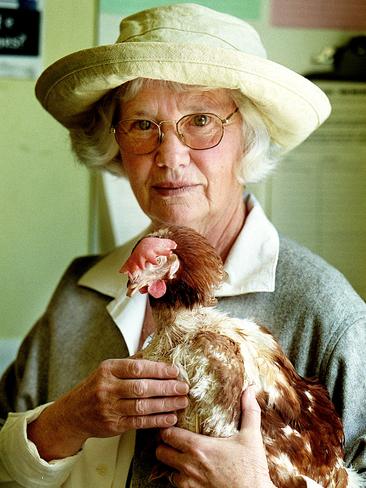
Tasmania Police was scathing in its criticism of the protest, which brought peak-hour traffic near to standstill for an hour after a city-bound lane was closed.
About 20 to 30 protesters from Animal Liberation Tasmania waved placards from the bridge walkway, while two people allegedly climbed on to a gantry and hooked themselves onto the bridge.
Two people have been charged with trespass and creating a nuisance.
The group has apologised for the frustration caused, but they hope people will consider their cause.
“In the one hour that people were stuck in traffic, 10 million land animals were killed around the world for food,” Ms Gupta says.
The group says they received support from “around the country” for their bridge protest, and will plan other ways to raise awareness.
Some people view all forms of meat consumption as an act of barbarism, but there are others who believe meat eaters can make ethical animal-welfare choices.
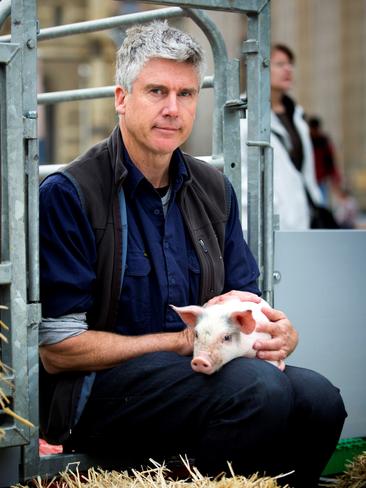
Foodie Matthew Evans says there is growing concern among mainstream meat eaters about the welfare of the animals they are consuming.
“Any right-minded Tasmanian would not be in favour of animal cruelty,” Mr Evans says.
The former chef and food critic has expressed his concerns in a new documentary For the Love of Meat, which premiered on SBS last Thursday.
The show tries to get behind the doors of meat production in Australia to force transparency upon the big producers of beef, chicken and pork.
Mr Evans, a meat eater and small-scale farmer, says he is not trying to force people to give up meat. “Animals are living and dying on our behalf, so we bear more responsibility,” he says.
Mr Evans tries to tread the middle ground between his love of animals and his understanding of the reality of farming, but he understands why activists do what they do.
But he believes the debate can be so polarised that meat eaters become too guilt ridden to have a voice.
“Meat eaters have been left out of the conversation”.
For his part, he believes meat can be eaten guilt free if it is farmed ethically.
And he points out that even the farming of grains, fruits and vegetables can involve some form of pest control — whether it be the eradication of rodents in a wheat crop or possums in an apple orchard.
“If you eat frozen peas, you have to realise that wallabies and possums have probably been killed so the farmer can have a pea crop.”
That said, Mr Evans admits vegetarians and vegans do “tread on the earth more lightly”.
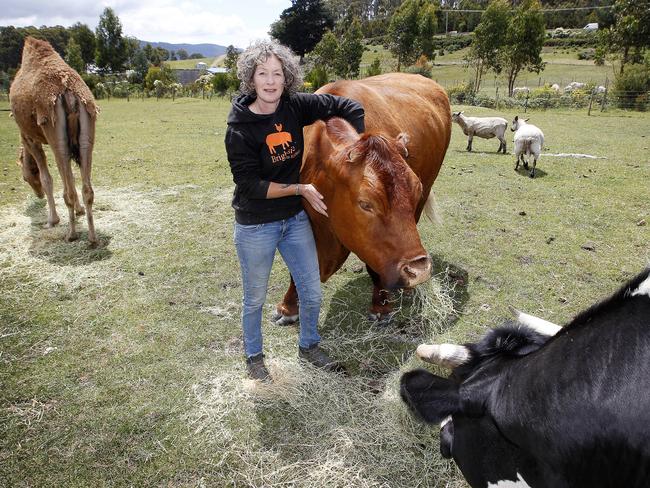
For Brightside Farm Sanctuary founder Haswell, plant-based diets are the most ethical option.
Vegan diets are better for animal welfare, human health and the planet, she says.
Ms Haswell was a 2015 Australian of the Year state finalist, in recognition of her sanctuary for rescued animals and her work in exposing problems in intensive farming operations.
While the RSPCA tries to steer clear of engaging in animal activism, it devotes itself to education and advocacy for animal welfare.
The RSPCA’s West says the organisation is constantly working towards legislative changes, such as its national campaign to phase out caged egg production.
“If we are to get laws changed, we have to work with government and statutory bodies by dealing with facts, figures and research,” he says.
But the RSPCA remains committed to investigating complaints of animal cruelty, and the organisation took seriously the concerns about the goldfish installation at Mona, by Greek artist Jannis Kounellis.
Mona curator Jarrod Rawlins says the staff are fish lovers too — and the work involves many goldfish working on rotation, by doing short stints in the bowl and spending most of their time in a luxurious fish tank.
“They are our office pride and joy. The conditions under which they live and work are all RSPCA checked and approved.”
Originally published as Protesters walk a fine line in fight for animal rights

